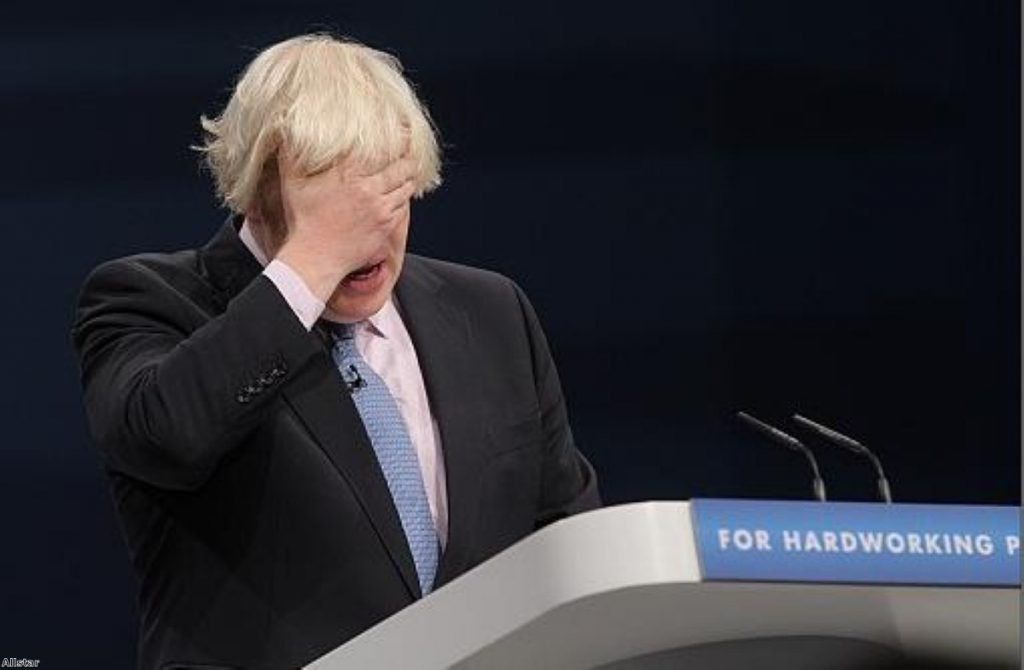Boris’ worst day: Mayor attacked by friends and enemies for ‘greed is good’ speech
Boris Johnson was enduring one of his worst days as mayor of London today, after a speech in which he praised the role of greed in society was savaged by friends and opponents alike.
Figures from the right and left criticised the mayor's Margaret Thatcher lecture for the Centre for Policy Studies as a celebration of greed and envy.
"I can assure you that as a sincere Christian Mrs Thatcher regarded greed and envy as sins," Tory backbencher John Redwood wrote on his blog.
"She wanted to encourage self reliance, self help and the protestant work ethic, not excess."


Nick Clegg said the London mayor was treating the British people "like a breed of dogs".
Speaking on his weekly LBC phone-in show, the deputy prime minister said: "I have to say these comments reveal a fairly unpleasant, careless elitism that somehow suggests that we should give up on a whole swathe of our fellow citizens.
"I think the danger is if you start taking such a deterministic view of people and start saying they've got a number attached to them, in this case an IQ number, somehow they're not really going to rise to the top of the cornflake packet, that is complete anathema to everything I've always stood for in politics."
Lib Dem president Tim Farron tweeted: "Boris' speech seems to bring to light the worst of Thatcherism. Greed is not good & high IQ doesn't mean success"
David Lammy, Labour MP and expected challenger for the Labour mayoral candidacy, told the World at One: "I don't think that's just careless. I think it's an insult; it's an insult to cleaners in London, to people who are home carers in London, people who are minimum wage, giving them the suggestion that they are sort of bottom of the cornflake packet.
"That's not the sort of society that I thought we wanted to live in."
Labour MP Nia Griffith said: "Boris praising inequality and envy is stark reminder of just how dangerous the Tories are… The buffoon's mask comes off"
Johnson's speech, which came a week after he called for automatic knighthoods for the very wealthy, saw him call for governments stop trying to eradicate inequality and accept it as a social good.
"I don't believe that economic equality is possible. Indeed, some measure of inequality is essential for the spirit of envy and keeping up with the Joneses that is, like greed, a valuable spur to economic activity," he said.
"Though it would be wrong to persecute the rich, and madness to try and stifle wealth creation, and futile to try to stamp out inequality, we should only tolerate this wealth gap on two conditions.
"One, that we help those who genuinely cannot compete; and, two, that we provide opportunity for those who can."
Johnson's praise for the beneficial effects of greed reflects a key tenet of free-market ideology but most leading Conservatives would balk at making the case so unapologetically and publicly.
The mayor's decision to make the speech will be another reminder to Conservatives of his ability to communicate right-wing political thought in plain terms but will also strike a note of caution about how his outspoken views would be treated if he was leading the party.
"I am afraid that violent economic centrifuge is operating on human beings who are already very far from equal in raw ability, if not spiritual worth," he said.
"Whatever you may think of the value of IQ tests, it is surely relevant to a conversation about equality that as many as 16% of our species have an IQ below 85, while about two per cent have an IQ above 130.
"The harder you shake the pack, the easier it will be for some cornflakes to get to the top. And for one reason or another – boardroom greed or, as I am assured, the natural and God-given talent of boardroom inhabitants – the income gap between the top cornflakes and the bottom cornflakes is getting wider than ever."
Johnson called for an increase in efforts to boost social mobility, notably through a reintroduction of grammar schools.
"I remember once sitting in a meeting of the Tory shadow education team and listening with mounting disbelief to a conversation in which we all agreed solemnly that it would be political madness to try to bring back the grammar schools – while I happened to know that most of the people in that room were about to make use, as parents, of some of the most viciously selective schools in the country," he said.
Labour is slowly gearing up for a closed primary to choose its candidate for London mayor in 2016, with former Olympics minister Tessa Jowell widely considered the frontrunner.









